
 In August, Francois Hollande appointed respected banker Emmanuel Macron to the post of France’s economy minister, replacing the fiery leftist Arnaud Montebourg. The subsequent ire raised within the country’s — and Hollande’s — socialist base was palpable, as was the sense of relief within business circles .
In August, Francois Hollande appointed respected banker Emmanuel Macron to the post of France’s economy minister, replacing the fiery leftist Arnaud Montebourg. The subsequent ire raised within the country’s — and Hollande’s — socialist base was palpable, as was the sense of relief within business circles .
One of those business leaders, financier Christophe Mazurier, in charge of CM-CIC Private Banking international network, approved the appointment. Instead of calling it a retreat ? for Hollande, Mazurier said it was one of the first decisions the president has made since his election in May 2012 that actually fitted his true desire for a more centrist approach.
In a recent editorial for Les Echos, a French business newspaper, Mazurier praised the move as vital to forging trust between the often at-odds political and business structures.
“The appointment of Macron is much more consistent with the previous economic line of the government (than Montebourg),” Mazurier said. “Putting people in accordance with his statements of intent, the president assured his word would carry longer range, and in this way he is more likely to restore credit lost in recent months.
“Above all, this appointment is likely to offer hope for the return of political and fiscal stability to reassure investors and businesses. As it is understood, Macron is one of them.”
Macron is indeed “one of them.” After training at the elite École Nationale d’Administration, Macron went on to earn the nickname “the Mozart of Finance” after engineering a number of major takeover deals at Rothschild in Paris. At only 36, Macron is something of a whiz, and has advised Hollande both on the campaign trail and since his election as a deputy chief of staff.
Now he is one of the youngest cabinet members ever, and Macron assumes the role of economy minister at a critical time in the history of France. Despite repeated complaints from the left, the French welfare state is sluggish and in danger of collapse, with record unemployment soaring as high as 11 percent, workers threatening to set their own factories ablaze, and a bloated public sector. Industry has all but abandoned France, looking abroad to build better facilities and attract a cheaper workforce.
Hollande is hoping Macron can straddle the line between bringing businesses back into the fold while not alienating his vocal socialist electoral base. It is a line Hollande has not always straddled in his more than two years in office, advocating openly for the middle class and chasten the financial industry, while quietly convincing the business sector that he would allow themtax breaks. This policy has often backfired, as Hollande continues searching for the right combination of ministers and message to globalize the French economy without losing any of the nation’s quintessentially French attitudes toward equality, universal education, and employment.
With Macron, the financier Mazurier thinks Hollande has, if not a solution, then at least a step in the right direction. While Mazurier said Montebourg had his positive moments, his brash attitude toward businesses did not engender trust, whereas Macron is quieter, younger and a former banker himself. He understands the motivations of the business sector, and the positive role it should have, in a way a career politician never could.
As both a liberal and a banker, Macron is something of a rarity, especially in the history of French politics, and that unique centrism is something Hollande could use more of as he transitions into a new era of French economic politics.
